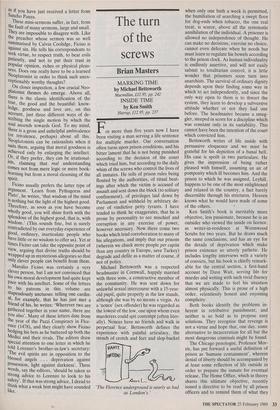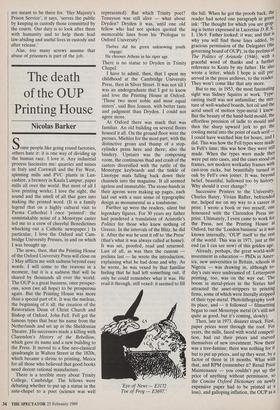The turn of the screws
Brian Masters
MARKING TIME by Michael Bettsworth Macmillan, f12.95, pp. 242 INSIDE TIME by Ken Smith
Harrap, £12.95, pp. 237
For more than five years now I have been visiting a man serving a life sentence for multiple murder. Our conversation often turns upon prison conditions, and his bitter lament that he is not being punished according to the decision of the court which tried him, but according to the daily whim of the screws who control the lives of all inmates. He tells of prison rules being flouted by the authorities, of ritual beat- ings after which the victim is accused of assault and sent down the block (to solitary confinement), of privileges laid down by Parliament and withheld by arbitrary de- cree of vindictive petty tyrants. I have tended to think he exaggerates, that he is prone by personality to see mischief and corruption in any exercise of power, however necessary. Now there come two books which lend corroboration to many of his allegations, and imply that our prisons (wherein we chuck more people per capita than any country in Europe, save Turkey) degrade and defile as a matter of course, if not of policy.
Michael Bettsworth was a respected headmaster in Cornwall, happily married with three sons, a constructive member of the community. He was sent down for unlawful sexual intercourse with a 15-year- old pupil, quite properly as the law stands, although she was by no means a virgin. As a 'nonce' (sex offender) he was regarded as the lowest of the low, one upon whom even murderers could spit contempt (often liter- ally). Nonces have no friends and walk in perpetual fear. Bettsworth defines the experience with painful articulacy, the stench of crotch and feet and slop-bucket 'The Florence underground is nearly as bad as London's.' when only one bath a week is permitted, the humiliation of searching a swept floor for dog-ends when tobacco, the one real treat, is scarce, above all the systematic annihilation of the individual. A prisoner is allowed no independence of thought. He can make no decisions, exercise no choice, cannot even defecate when he needs but must learn to regulate his bowels according to the prison clock. As human individuality is endlessly assertive, and will not easily submit to totalitarian control, it is little wonder that prisoners soon turn into anarchists. The survival of ordinary dignity depends upon their finding some way in which to act independently, and since the only way open to them is to thwart the system, they learn to develop a subversive attitude whether or not they had one before. The headmaster became a smug- gler, steeped in scorn for a discipline which was constant only in its variability. This cannot have been the intention of the court which convicted him.
Bettsworth writes of life inside with persuasive eloquence and we must be grateful for his depiction of a banal hell. His case is spoilt in two particulars. He gives the impression of being rather pleased with himself, assuming an air of pomposity which ill becomes him. And the prison to which he was assigned, Leyhill, happens to be one of the most enlightened and relaxed in the country, a fact barely discernible through his strictures. Heaven knows what he would have made of some of the others.
Ken Smith's book is inevitably more objective, less passionate, because he is an outsider who viewed the inside on licence, as writer-in-residence at Wormwood Scrubs for two years. But he draws much the same conclusions, and has an eye for the details of deprivation which make prison existence so utterly pathetic. He includes lengthy interviews with a variety of convicts, but his book is chiefly remark- able for the central section, a first-hand account by Dave Wait, serving life for murder and writing with such vivid fluency that we are made to feel his situation almost physically. This is prose of a high order, relentlessly honest and enjoining complicity.
Both books identify the problems in- herent in retributive punishment, and neither is so bold as to propose easy solutions. They recognise that revenge is not a virtue and hope that, one day, some alternative to incarceration for all but the most dangerous criminals might be found.
The Chicago penologist, Professor Mor- ris, has put forward a useful definition of prison as 'humane containment', wherein denial of liberty should be accompanied by at least some reflection of life outside in order to prepare the inmate for eventual release. The Home Office, which in theory shares this ultimate objective, recently issued a directive to be read by all prison officers and to remind them of what they are meant to be there for. 'Her Majesty's Prison Service', it says, 'serves the public by keeping in custody those committed by the courts. Our duty is to look after them with humanity and to help them lead law-abiding and useful lives in custody and after release.'
Alas, too many screws assume that abuse of prisoners is part of the job.

















































 Previous page
Previous page